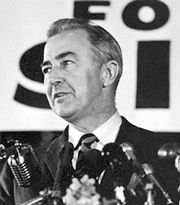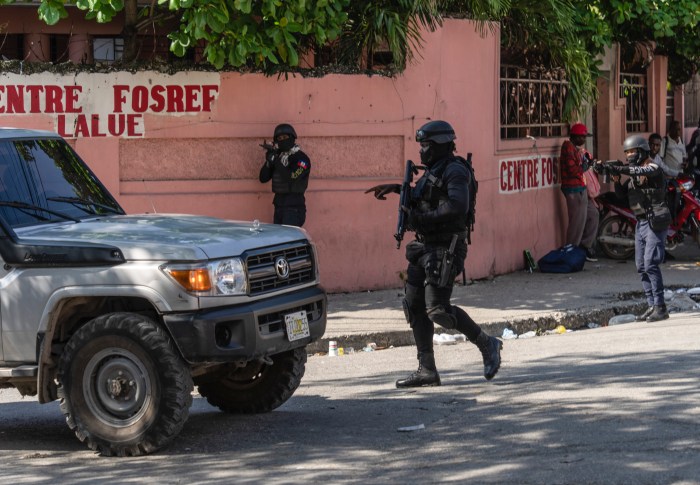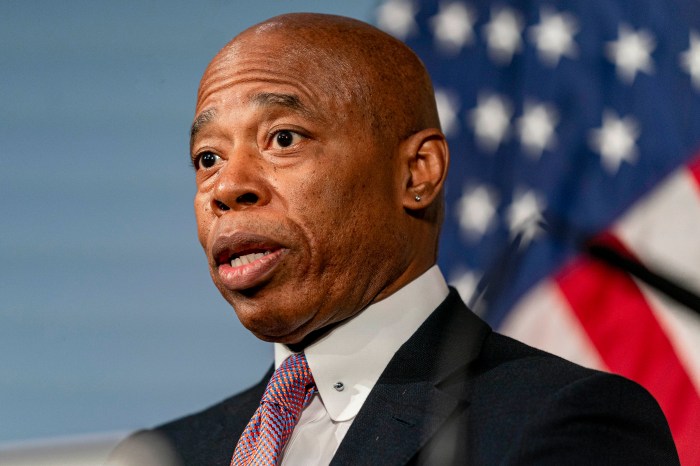“God dammit,” the kid was now saying, “God damn him to hell. Why won’t he do what we’ve scheduled him to do? Why won’t he come show his face and shake hands with the people on this street?”—whatever main street it was in whatever town it was—Nashua, Manchester, Concord, Claremont, they all blur together when you’re on the Sisyphus-like campaign grind.
“Look at Romney,” the kid said—automobile tycoon George Romney, the hollow-centered banality-spouting Republican would-be from Michigan. “He’s out on these sidewalks every day, goosing up a rally every 10 minutes.”
Well, I said, you know Gene McCarthy. He won’t pander. He never has. He won’t do anything anybody tells him to do, thinks he should do.
“Yes,” said the kid, his face lighting up like an angel’s. “Isn’t he beautiful!”
The man in question was not only beautiful in that sense, but Eugene J. McCarthy of Minnesota, who died December 10 at 89, was one of the only two politicians—okay, after FDR—I ever fell in love with, the other being Illinois’ Adlai Stevenson for whom McCarthy had given a dazzling nominating speech at the 1960 Democratic National Convention.
Now it was 1968, and Gene McCarthy, after walking in angry despair out of a hearing room where Secretary of State Dean Rusk had justified the war in Viet Nam by dangling the specter of, if I remember right, “one billion” Chinese Communists just waiting for Saigon to fall, had decided it was time no longer to talk, but to act.
If the only way to end the war was to evict from the White House the man who had inherited Viet Nam from John F. Kennedy and made it much worse, Rolling Thunder, napalm, hearts-and-minds and all, well then, somebody—some Democrat—would have to have the guts to go up one-on-one against Lyndon Johnson. And no other Democrat would. Would even dare to peep.
It is what Sir Thomas More, McCarthy’s role model, would have done—the Sir Thomas More, a Roman Catholic for all seasons, who on a matter of principle and ethics went up against Henry VIII and lost his head for it.
So now it is 1968, and I, covering McCarthy for my newspaper, am in New Hampshire, where all the polls and all the columnists and all the insiders don’t even show him on the radar screen; but, as it happens, I, who went to school in New Hampshire, know just how cagey the citizens of the Granite State can be. It’s not that they lie to the pollsters, exactly, but…
McCarthy doesn’t go around shaking hands, or not very much, and he doesn’t speechify hardly at all, but he does, from time to time, write and quote poetry, and W.B. Yeats is high among the favorites of the Gene McCarthy whose blood is half Irish, half German.
In his lovely, sensitive obituary in The New York Times, Francis X. Clines quotes from Yeats’ “An Irish Airman Foresees His Death,” but he quotes the wrong lines. The ones that are in fact deeply applicable to McCarthy are:
I know that I shall meet my fate
Somewhere among the clouds above;
Those that I fight I do not hate
Those that I guard I do not love.
I don’t know whether Gene McCarthy actually hated those whom he fought—certainly not LBJ, much as he might disapprove of Lyndon’s manner and methods; maybe not even Robert Kennedy—but I do know that he did not love the radical New Left embodied, for one, by New Hampshire campaign press secretary Seymour Hersh.
(And Hersh, I think, returned the disapproval, looking upon McCarthy as just a sort of high-flown tool with which to pry Johnson out of the presidency and end the war. Next I heard of Seymour was when, 20 months later, he called me up from wherever he was to say he had a tip about something that had gone bad in a village in Viet Nam. I took the info to Paul Sann, executive editor of the old, liberal New York Post. “Nahhh!” said Sann. “Who’s Hersh and his nothing news agency?” and turned it down. The village was My Lai.)
Poetry. Poetry and baseball. Gene McCarthy was a large solidly built man, 6-foot-2, who had played semi-pro ball, and also large in physique was the poet Robert Lowell who was a friend of Gene’s and often hung out with him during this campaign. My one choicest memory is of Eugene McCarthy and Robert Lowell in a hotel room, somewhere in New Hampshire, doing hand over fist over hand over fist together on a baseball bat to decide about lunch.
(Eerie echo a year and a half later, at the trial of the Chicago 7 that had sprung from the tumult at the Democratic National Convention that had sprung from McCarthy’s undoing of LBJ in New Hampshire—Abbie Hoffman to the assembled press: “Conspiracy? We couldn’t agree on lunch.”)
I also remember McCarthy’s large hand in another way, at another moment. We were somewhere in New Hampshire, just he and I alone for an instant, in bright sunlight, waiting for a car to go somewhere to do something. In that day’s news, Lyndon Johnson had called upon Abe Fortas for advice on what to do about Viet Nam and the clamor in this country. McCarthy looked at me and dryly said: “I always thought that when a Southern politician got in trouble, he went to a black man for advice.”
He saw me scribbling this in my reporter’s notebook. And, with a grin—what you might call a solemn grin—put his hand atop my pen hand to stop me from writing it.
I remember having lunch in Washington, D.C., with Katie Louchheim, a Democratic behind-the-scenes power and hostess who was talking about the complexities and brilliance and barbed moodiness of Gene McCarthy, and whatever she knew about his roots. “Minnesota,” she said, “that strange state. Too much talent.” Hubert Humphrey, Walter Mondale, Eugene McCarthy, for starters.
In search of those roots, I’m driving a rent-a-car through frozen, sub-zero Minnesota, past endless lakes dotted here and there with fishing huts, and now I’m talking with the president of St. John’s University in Collegeville, the Roman Catholic institution from which the son of Michael J. and Anna Baden McCarthy was graduated in 1935.
Suddenly a swinging couple, a good-looking young woman in sweater and boots and a young man with longish hair, come galloping across campus. “See those two?” says the president whose name I wish I could remember, “That’s a nun and a priest.”
I remember later that year going for relief and spiritual renewal for a couple of days to Gettysburg, and, through tears that were welling up, studying the marker I’d stumbled upon where on July 2, 1863, at the foot of Little Round Top, the First Minnesota had held, had saved the Union—and, ultimately, the four-day battle that turned American history, America’s destiny—at a loss of more than 80 percent in dead and wounded of the regiment’s 262 men.
I remember when the figures started coming in from New Hampshire on the night of March 12, 1968, and ended up: Eugene McCarthy, 42 percent, Lyndon Johnson, 49, a loss, yes, but what a victory.
I remember the New York Post headline, next day or the day after that: NOW BOBBY SAYS HE’LL RUN. I also remember my disgust. You might even call it shame—shame for the shamelessness of it.
I remember being in Wisconsin two weeks later when somebody yelled: “Look at the television!” and there on the tube, morose and heavy, was Lyndon Baines Johnson tacking onto the end of his speech the announcement that he would not be seeking re-election.
And I remember—oh boy, do I remember—the smell of stink bombs in the hotel lobbies of Chicago that August, and tear gas on the streets, and pressing through a triple line of frozen-faced, impassive young National Guardsmen to get across any street, and Mayor Richard J. Daley in the convention hall screaming: “Kike! Jew!” and worse at Connecticut Senator Abraham Ribicoff, who dared to decry “the Gestapo tactics in the streets of Chicago” from the podium. And I remember the night Daley’s cops invaded the hotel rooms where the Clean for Gene kids were working, and beat them up, and Jimmy Breslin, in one press room or bar or another, looking over to me and saying: “Your guy’s not doing too well.”
There is one other name I cannot now remember. It is that of McCarthy’s campaign manager and confidant, a wild and devout loyalist—Irish, I think—whose motto was: “Each day we die, each night we sleep, and wake to die another day.”
You add up those deaths and you have a life. Also a victory.
Not to mention an object lesson. Oh, to wake once more like that.
gaycitynews.com


































